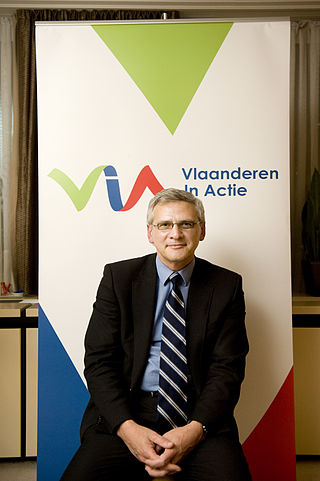
The Flemish Parliament constitutes the legislative power in Flanders for matters which fall within the competence of Flanders, both as a geographic region and as a cultural community of Belgium.

The Flemish Government is the executive branch of the Flemish Community and the Flemish Region of Belgium. It consists of a government cabinet, headed by the Minister-President and accountable to the Flemish Parliament, and the public administration divided into 13 policy areas, each with an executive department and multiple agencies.

Agoria, previously known as Fabrimetal, is a Belgian employers' organization and member of the Federation of Belgian Enterprises.

Interuniversity Microelectronics Centre (imec) is an international research & development organization, active in the fields of nanoelectronics and digital technologies with headquarters in Belgium. Luc Van den hove has served as president and CEO since 2009.
flanders.bio, founded in 2004, is the networking organisation for the life sciences sector in Flanders and represents and supports around 350 member companies. The key strategic objectives of flanders.bio are knowledge exchange and valorisation, human capital development, internationalization of the cluster activities and visibility, familiarization of the public with products derived from the sector and the further development of a supportive environment for the members of flanders.bio.
The Agency for Innovation by Science and Technology was a Flemish agency between 1991 and 2015. It was an externally autonomized agency of the Flemish Government, in charge of innovation policy in Flanders and located in the Ellipse-Building in Brussels.
The National Fund for Scientific Research (NFSR) was once a government institution in Belgium for supporting scientific research until it was split into two separate organizations:
iMinds was a Flemish non-profit organization, founded by the Flemish Government. It was founded as a research institute, with a focus on information & communication technology (ICT) in general, and applications of broadband technology in particular. iMinds offers companies and organizations active support in research and development. It brings together companies, authorities, and non-profit organizations to join forces on research projects.
The Society and Technology Institute was from 2000 until 2013 a Flemish institute. The institute was associated with the Flemish Parliament, for which it provided advice on complex issues involving society and technology.
The Flemish Council for Science and Innovation, previously known as the Flemish Council for Science Policy is the advisory body of the Flemish Government and the Flemish Parliament for science and technology policy. The VRWB provides advice concerning science and technology policy on its own initiative or on request. It provides recommendations, conducts investigations and provides its opinion on science and technology for Flanders. Dirk Boogmans is the Chairman of the Flemish Council for Science and Innovation. In 2016, it was abolished and reformed as the Flemish Advisory Council for Innovation and Entrepreneurialism.
Science and technology in Flanders, being the Flemish Community and more specifically the northern region of Belgium (Europe), is well developed with the presence of several universities and research institutes. These are strongly spread over all Flemish cities, from Kortrijk and Bruges in the Western side, over Ghent as a major university center alongside Antwerp, Brussels and Leuven to Hasselt and Diepenbeek in the Eastern side.

Flanders in Action is a social and economic action programme for the future of Flanders which was established by the Flemish government on 11 July 2006.
Science and technology in Belgium is well developed with the presence of several universities and research institutes. As Belgium is a federal state, science is organized at several levels. At the national level, there is the Belgian Federal Science Policy Office (BELSPO) and each of the three regions, Brussels-Capital Region, Flanders and Wallonia have their own regional science and technology development:
The technological innovation system is a concept developed within the scientific field of innovation studies which serves to explain the nature and rate of technological change. A Technological Innovation System can be defined as ‘a dynamic network of agents interacting in a specific economic/industrial area under a particular institutional infrastructure and involved in the generation, diffusion, and utilization of technology’.

The Federal Ministry of Innovation, Science and Technology is a Nigerian ministry whose mission is to facilitate the development and deployment of science and technology apparatus to enhance the pace of socio-economic development of the country through appropriate technological inputs into productive activities in the nation. It is headed by a Minister appointed by the President, assisted by a Permanent Secretary, who is a career civil servant. President Bola Tinubu, GCFR on 16 August 2023 appointed Uche Nnaji as the Minister of Science and Technology. Mr James Sule, mni is the current permanent secretary in the ministry.
Dr. Cyrus Wadia is an American CEO and sustainability expert. He is currently the CEO of Activate and has previously held leadership positions at Amazon and Nike. He also served as Assistant Director in the White House Office of Science and Technology Policy.

Agriculture and horticulture in Flanders has traditionally a familial character, but just like agriculture in other regions, is increasingly characterised by an increase in scale, modernisation and expansion. In Flanders, intensive sectors constitute the largest segment of agriculture: pig breeding, poultry and dairy farming, vegetables and fruit, and ornamental plant culture. In Wallonia, the French-speaking part of Belgium, the emphasis is more on arable farming and extensive soil-based cattle breeding.
Science and technology in Kazakhstan – government policies to develop science, technology and innovation in Kazakhstan.
Science and technology in Uzbekistan examines government efforts to develop a national innovation system and the impact of these policies.

The Research Foundation – Flanders is a Belgian public research council, based in Brussels. The Flemish research council aims to sponsor ground-breaking research and innovation. Much of this work involves supporting researchers and undertakings in association with the universities and institutes of Flanders, including Ghent University, University of Leuven, University of Antwerp and Free University of Brussels, among others.








